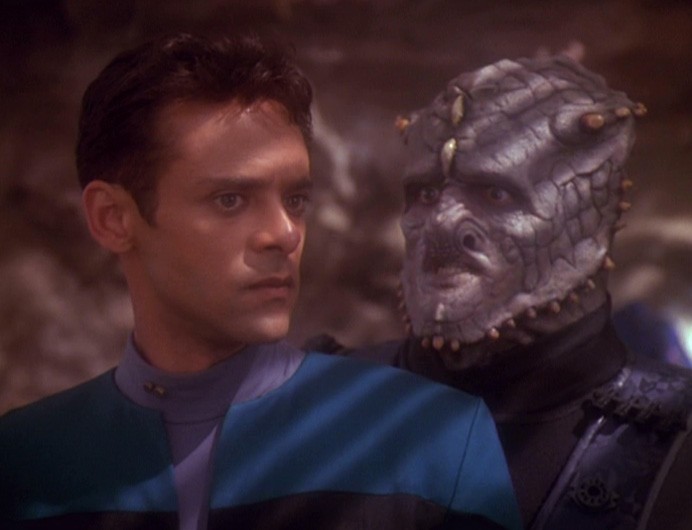“HIPPOCRATIC OATH”
“...and once you’ve fixed our drug addiction, we want cosmetic surgery. I’m thinking less lizard man...more Chris Hemsworth.”
While nowhere near the level of the previous episode, DS9’s fourth season nevertheless triumphs with another strong episode. Believe it or not, this is only the
third time we’ve seen the Jem’Hadar since their eponymous debut in the second season finale (if you exclude some Jem’Hadar ships kicking ass in “The Die is Cast”). Hard to believe, because by this point it feels like we know the Dominion, when in fact some of the basic facts about them have yet to be revealed. This is, for example, the first episode that names their drug, Ketracel White, and we still haven’t seen a Vorta beyond Eris (whose species was unidentified) and Borath (who claimed to be a Founder).
More than anything, I was relieved that we got a Dominion story so soon into the season, because it eased my fear that the Dominion was being edged out in favour of the Klingons, who I find infinitely less interesting and imposing as villains. I was also initially concerned that we might be getting an “I, Borg” style humanising of the Jem’Hadar with Goran’agar in the place of Hugh. To an extent we do, for Goran’agar (ably played by Scott Thompson, who previously appeared as “Tosk” in “Captive Pursuit”) is clearly the most personable and noblest Jem’Hadar we’ve yet encountered. It’s easy to sympathise with his plight and support his attempts to free his men of their addiction. Fortunately, the writers don’t go quite as cute and cuddly as they did with Hugh, and the Jem’Hadar retain their menace and sense of danger. These are not nice guys, and you certainly wouldn’t want to hang out with them—but they’re not “Evil”. They’re just the way they’re programmed to be, and these particular men are doing their best to exceed the limits of that programming, in order to recover a sense of agency and ownership of their own destiny.
It’s understandable that Bashir sympathises with their objective and agrees to help. This, of course, leads to the episode’s core conflict, between the humanistic Bashir and the more pragmatic O’Brien, and it’s beautifully done. The show has done a wonderful job of building up their friendship over the past three years, so to see it crumbling now actually has a fair punch. Ultimately, there’s no cut and dry “right and wrong” to this dilemma, and I can see it from both ways. Ever the idealist, I used to side more with Bashir, but now I can understand O’Brien’s perspective more: these guys are still the enemy and Bashir is basically colluding with them; the consequences of which no one can know. It’s superb, meaty stuff, and I like the ambiguous closing scene where we see just how much it’s damaged their friendship, while also acknowledging that with time it may (and, indeed, will) heal. Kudos to both Alexander Siddig and Colm Meaney, who turn in first rate performances. I wasn’t quite as sold on Rene Auberjonois’ directing this time, though: it does the job, but feels a tad pedestrian.
The episode’s sub-plot shows Worf struggling to fit into an environment that’s about as far from the bright and orderly Enterprise as you can imagine. It was only inevitable that the former Security Chief would eventually come to blows with the obstinate and cranky Odo, and it’s quite fun to see, with Sisko providing a stabilising balance as he gently supports his new officer and assures him that he will eventually fit in. It’s not a hugely memorable storyline, but it’s a necessary and reasonably effective one.
Rating: 8
 )
) )
)
 )
)
 Anyway, my read on the episode was that Dukat was behind this. When Sisko says he can't find any corroborating evidence, and then further that he can't even find the guy who made the accusation, and then later the whole thing turns out to have been an elaborate plot by Dukat to hurt Kotan Pa'Dar, it became pretty clear that Dukat had put Zolan up to making the accusation in order to galvanize the investigation and set the whole thing in motion.
Anyway, my read on the episode was that Dukat was behind this. When Sisko says he can't find any corroborating evidence, and then further that he can't even find the guy who made the accusation, and then later the whole thing turns out to have been an elaborate plot by Dukat to hurt Kotan Pa'Dar, it became pretty clear that Dukat had put Zolan up to making the accusation in order to galvanize the investigation and set the whole thing in motion.